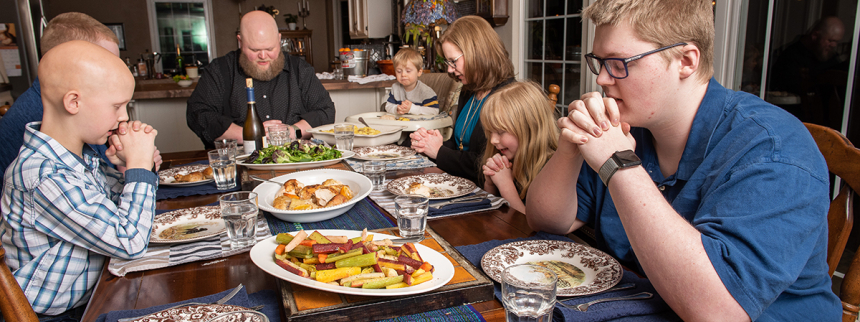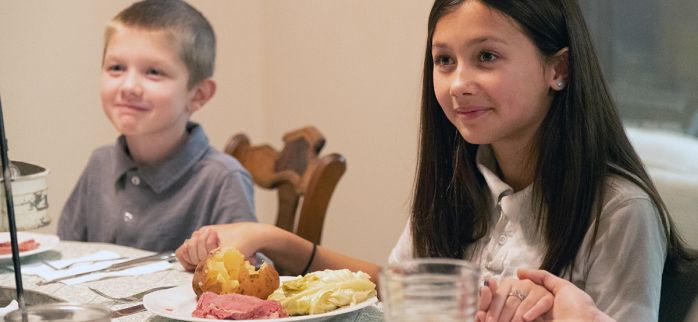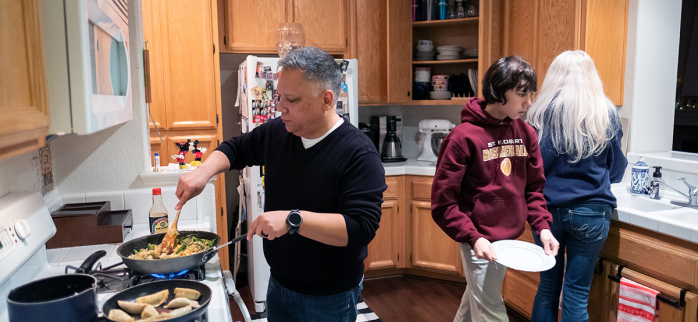
In photo above, the Bowers family of Sacred Heart Parish in Gridley say grace before dinner. Parents Adam and Maralee, and their children, Thomas, John Pau, AJ, Lucy and Max.
Years ago, at age 15, Adam Bowers invited a group of friends to get together for a dinner party. Though he enjoyed cooking, the true objective was gaining a chance to spend time with a young woman, Maralee, who he was interested in.
About seven years later, Adam and Maralee were settling into married life and living in Chicago. Adam was working at a Chicago-based law firm and Maralee was in medical school. With their first child on the way, they were invited to a family dinner at the household of a mentor physician to Maralee. As recent converts to Catholicism, Adam and Maralee had never before encountered a family like the Whites, a tight-knit and welcoming group with many children who had extended the invitation to Sunday dinner at their home.
As guests in the home of the Whites, Adam and Maralee encountered for the first time what the Catholic Church refers to as the “domestic church,” where the family carries out its “evangelizing and missionary task” (Catechism of the Catholic Church, No. 2204). For them it was a revelation that gave life to their vision for their own family, because the Whites presented themselves authentically, in their element – busy, frantic and even a bit chaotic – and yet engaged in one another’s lives, with Christ at the center of their family.
As the evening with the Whites unfolded, it included prayer, good food and drink, laughter and thoughtful discussion that continued long after dinner concluded. Even the adult children, who were living out of the house, were joyfully present for the gathering. “We had never felt so loved and so welcomed. We left feeling loved and cared for. We had been a part of something very important – their family dinner,” Maralee recalls.
Almost 20 years later, Adam, a candidate for the permanent diaconate for the diocese and a member of the Diocesan Pastoral Council, who continues to practice law from home for the same firm in Chicago, and Maralee, a family practice physician, believe the experience of being guests of the White family was a providential gift to their own family.
The Bowers family, members of Sacred Heart Parish in Gridley, continues the tradition of the daily family dinner, into which they incorporate their own ministry of hospitality by frequently welcoming guests to their home.
Among their guests include new friends from their parish, newly-married couples, young families, clergy, members of religious orders, travelers and missionaries. “They arrive as strangers and leave as friends,” Maralee says, while discussing their willingness to welcome new acquaintances to join their family for a meal. Each invitation leads to new connections and opportunities for all to become cooperators in a “community of faith, hope and charity.” (CCC, No. 2204).
The Bowers family continues to recall the example of the Whites. “Remember the Whites” is said around their home from time to time, as they prepare to welcome guests for dinner. “It doesn’t have to be perfect, but what is most important is the time spent together,” Adam says, reflecting on the moments to step back from a busy life, to give thanks, enjoy a meal and reconnect as a family.
Thomas, 16, the eldest of the five children, sees the dinners as a valuable use of time. “With a lot of my peers, (dinner together is) not a common practice. They end up doing their own thing – they just grab something from the stove and they don’t eat together. Eating together has always been a part of families, and nowadays it isn’t as much practiced, but I think it’s a good thing to continue.”
Each member of the family has his or her unique role in making it all come together. Adam is the one who usually prepares the meal. AJ, 10, sets the table, while John Paul, 13, does the dishes after the meal, a role that he reluctantly accepts, though he does so with love. “I had to do the dishes when I was your age,” Thomas jokingly reminds John Paul, as the family laughs together. The family’s youngest children are Lucy, 6, and Max, 3.
Ninety miles north of the Bowers family in Redding, the Clark family makes time for the practice of daily family dinners. Lloyd and Laura Clark have made it a priority to recapitulate at the end of the day with their children. Even after long commutes and extracurricular activities, dinner will be served at the table and the family will take a moment to reconnect and share stories from the day.
Laura and Lloyd met as teenagers, when both were counselors at Camp Pendola, the diocese’s summer ministry for families. Laura is principal of Sacred Heart School in Red Bluff and Lloyd works as a union steelworker – commuting to Sacramento or even San Francisco for some jobs. They are members of Sacred Heart Parish with their children: Bobby, 18, Abigayle, 15, Savannah, 12, Jayden, 9, and Colin, 7. Angel, their oldest son, is away at college.
“Sometimes it’s not until 7:30 or 8 in the evening until we eat, but we make it happen,” Laura notes. “We notice if we don’t have family dinners – if something comes up, we feel disconnected from each other.”
The Clarks often reminisce about the notable Christmas and Thanksgiving dinners they have celebrated in years past, particularly the times where they’ve welcomed family members from out of town and how they had to set up tables to accommodate their extended family. Beyond these special occasions, the daily family dinner creates a moment of beauty in the ordinary occurrences of everyday life. It’s a time set apart, reserved for family and the value of reconnecting.
“I work so far away, I don’t know what’s going on during the day,” Lloyd says. “We do text and keep up with our phones, but it’s not the connection of being face to face. Abigayle, a sophomore at Mercy High School in Red Bluff, adds: “Some of my friends’ families don’t eat together. They just find food and go sit in their own rooms. I get to tell funny stories from my day to my family.”
Both the Clark family and the Bowers family end the traditional meal prayer with a common line, with unknown origin. “And keep us mindful of the needs of others,” is a reminder of the needs of their neighbors who are without the opportunity for a family dinner.
The Mendoza family of St. Robert Parish in Sacramento cannot remember a time without nightly family dinners. “It’s expected,” says Colleen Mendoza, describing how her family gathers every evening for dinner and at least one weekend morning for a big family breakfast.
Parishioners at St. Robert Parish in Sacramento, Colleen, Paul and their two sons uphold a routine of flexibility, adjusting the dinner hour so they can come together to eat and communicate about their days.
“There have been stressful times,” Colleen admits, and a few shared meals in the car, but overall, the family faithfully convenes at the dinner table. The Mendozas live in the Natomas area of Sacramento and Paul commutes a distance for work. They recall challenges when oldest son Timothy, 21, attended Christian Brothers High School and played varsity tennis after school in Elk Grove. Youngest son Jimi, 13, balances basketball practices at St. Robert School in Sacramento.
“I appreciate this time,” Paul explains, reflecting on hectic days. “It doesn’t just benefit our children.” Paul says he reaps benefits, too, just knowing they will “circle up as a family” at night.
The family relies on their shared dinner time to “catch up.” “It strengthens our bond,” Colleen says, conveying how each person feels free to talk openly in a safe environment where “nothing is off limits.”
“I think it’s really nice that at least once a day we can all be together and talk,” interjects Jimmy, already wise to the importance of family meals. “We just talk about whatever is on our minds.”
“I don’t think many families spend enough time talking,” worries Paul. He sees how their own steadfast commitment to family mealtime has made a difference in how their sons value communication, mutual respect and family time.
“I definitely will want to have dinner with my family,” Jimi pledges. Paul joyfully jokes, “… and we’ll be barging in to join you!”
Timothy expects to graduate from St. Mary’s College in Moraga later this spring. While he lives away from home now, he fondly reflects on how important it had been to speak his thoughts at the dinner table. He knew that somebody was “going to listen intently.” He adds, “I could always count on our dinners for that.”
Colleen also points out that what they eat for dinner matters less than the “together time.” She concedes that “cooking is not a joy” for her but working together to put food on the table is.
“We actually all help to prepare the dinner,” she says happily, mentioning that “everybody helps set, clear and do the dishes.” She sees mealtime duties as “an extension of our together time,” while Paul quips, “We’re slyly teaching responsibility too!”
“We say grace before every dinner,” Paul says, revealing how they offer a seasoned, yet worthy prayer learned 17 years ago when Timothy attended preschool. They have personalized the rhyming words over time to give thanks and bless each other and their special mealtime meeting — a sacred time which supports, inspires and binds their family.
Research proves the value of family meals together
For 20 years, scientific studies across North America, Europe and Australia have validated what many families already know instinctively – family dinners are important. Yet, data also show families gather for a meal at home only half the time each week. Differing schedules, distractions, lack of time and lack of energy top the list of reasons and sometimes undermine families’ best opportunities for love, support, growth and health.
A non-profit initiative known as “The Family Dinner Project” maintains a website to encourage family meals. Co-founder Anne Fishel stresses a range of cognitive, physical and psychological benefits, including improved school performance and graduation rates, better cardiovascular health, lower obesity rates, lower rates of depression and anxiety, fewer behavior issues, and decreased likelihood of substance abuse. She insists that the communal aspect of family meals makes the difference – being together, talking and listening in a warm and safe environment.
Science backs up other positive by-products of family meals together. Better family relationships, greater happiness, less stress, emotional strength, healthier food choices, improved portion control and cost-savings all have been proven through empirical research.
Tom McGrath, former editor of U.S. Catholic magazine and former vice president of Loyola Press, sums up the research as “no surprise,” and wrote recently: “We bring all our hungers to the table – physical, emotional, social and spiritual – and all of them can be fed.” He punctuated how being present to one another is “how the magic happens” and that the dinner table becomes “a great place to prepare our minds and hearts to move from the family table to the table of the Lord in our parish.”
LEARN MORE
About “Nine Scientifically Proven Reasons to Eat Dinner as a Family at www.goodnet.org/articles/9-scientifically-proven-reasons-to-eat-dinner-as-family.
About “The Power of Family Meals” by Tom McGrath at www.loyolapress.com/our-catholic-faith/prayer/arts-and-faith/culinary-arts/the-power-of-family-meals.



